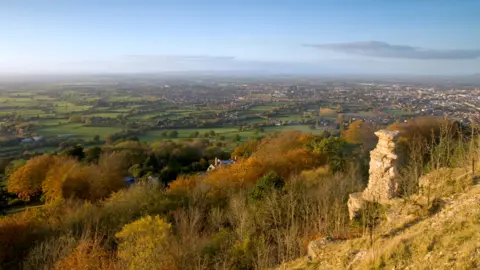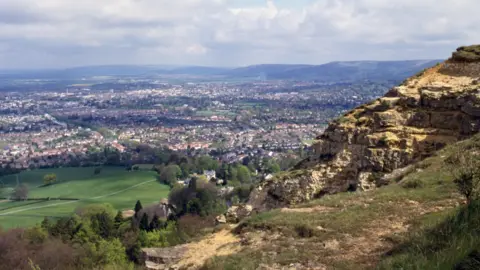Plan to protect beauty spot's Jurassic rocks
 Getty Images
Getty ImagesA popular beauty spot could be declared a National Nature Reserve (NNR) to protect its Jurassic rocks.
Natural England wants to make Leckhampton Hill and Charlton Kings Common in Cheltenham, Gloucestershire, an NNR to secure their long-term future.
The site has rocks dating from more than 165 million years ago which are exposed in quarries on and under the hill, and is home to a wide variety of wildlife.
Cheltenham Borough Council's cabinet will vote on whether it wishes to allow the site to be designated an NNR on Tuesday.
A council report said NNRs "include some of the best examples of England’s wildlife and geology" and "are considered among the most important places for nature".
If agreed, the site would join 221 NNRs across England, including four in Gloucestershire.
Leckhampton Hill has a network of disused quarries and the stone was used to build part of Georgian Cheltenham, such as the University of Gloucestershire's Francis Close Hall campus.
Small mammals such as rabbits and stoats live on the hill, as well as birds like buzzards and kestrels.
The council report added that the hill was "central to developing our understanding" of the Jurassic period.
"Leckhampton Hill and Charlton Kings Common has long been known by geologists for its unique exposures," it said.
 Getty Images
Getty ImagesGloucestershire Wildlife Trust said it was "really supportive" of the plan.
"The sites have a great mix of woodland, scrub and calcareous grasslands which support species such as adders, Duke of Burgundy butterfly and many species of plant including orchids," it added.
If the plans go ahead, Leckhampton Hill and Charlton Kings Common could become an NNR by spring 2025.
Follow BBC Gloucestershire on Facebook, X and Instagram. Send your story ideas to us on email or via WhatsApp on 0800 313 4630.
